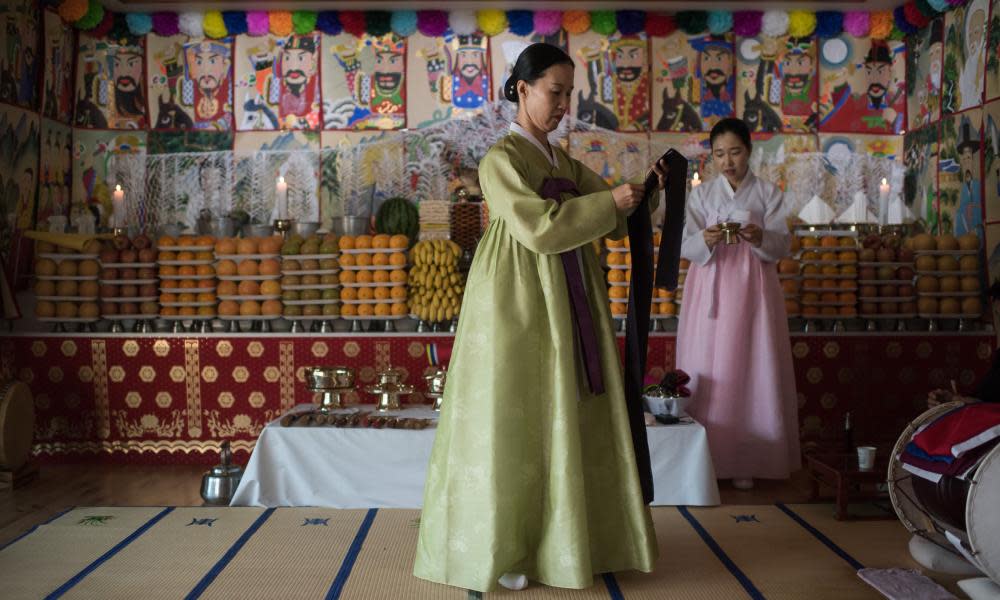Feminism and Nationalism in the Third World by Kumari Jayawardena – review

In the early 1980s the Sri Lankan historian Kumari Jayawardena, travelling by train from Brussels to The Hague, wrote lecture notes for a course on the history of women’s movements. Many lecture notes crumble into dust – but not these. They were published in 1982, and later evolved into the influential work Feminism and Nationalism in the Third World. The book has been republished, as one of Verso’s feminist classics, with a foreword by Rafia Zakaria.
More than three decades after it first came out, the book remains the best introduction to the history of women’s movements in Turkey, Egypt, Iran, India, Sri Lanka, Indonesia, the Philippines, China, Vietnam, Korea and Japan. It takes us into the lives and ideas of a host of women and men who sought reform and revolutionary transformation.
Their stories leap from the page. The poet Qiu Jin, born in 1875, broke with her husband and children in Beijing to study in Japan, adopted western male clothing, identified with rebellious “new women” and organised a women’s army. Her prose-poem, “Stones of the Jingwei Bird”, written in a form popular among women and the illiterate, connected the subordination Chinese women experienced to the humiliation of her country through imperialism. Qiu Jin was executed by the Manchu regime in 1907 for plotting rebellion.
Jayawardena traces long-standing forms of resistance: female warriors who rode into battle, for instance, and women who became shamans in Korea. She also records the work of learned men, such as Ibn Rushd in 12th-century Iran, who questioned women’s restricted lives, and Li Ruzhen, whose 1827 novel, Flowers in the Mirror, imagined a world in which Chinese men, rather than women, suffered footbinding.
Adopting a broad definition of 19th- and early 20th-century feminism as action against women’s “oppression and exploitation within the family, at work and in society”, she insists that, like other radical ideas, it is not ethnically circumscribed. Her thinking, while rooted within specific historical contexts, defies enclosure; in her book, claims for women’s emancipation intertwine with the modernising impetus within nationalist movements.
As the contradictory impact of global capitalism impinged on colonised women they drew on western thinking and feminism, but recast ideas of emancipation for themselves. Transmitted through women’s journals, books, letters and verbal reports from travellers, these ideas crossed borders. Thus women in Egypt heard of modernising secular reform in Turkey, while tales of Japanese “new women” reached China.
Jayawardena shows how education was a vital first step. Indian reformer Pandita Ramabai (1858-1922) was taught Sanskrit by her father. She used her knowledge to challenge social injustices and became a campaigner for women’s schools and colleges. In Indonesia, Raden Adjeng Kartini (1879‑1904) was inspired by reading about Pandita Ramabai. She was also encouraged by correspondence with Dutch socialists and feminists who were agitating not simply for women’s suffrage but for economic equality and sexual self-determination. Aware how even these friendly connections were distorted through the prism of colonialism, she nonetheless recognised that merely copying the “European world” was not the answer.
Jayawardena reveals a multifaceted nationalism, driven by romantic ideals of motherhood
The growth of nationalism during the late 19th and early 20th centuries contributed to a questioning of, and rebellion against, customary assumptions among men as well as women. In Turkey the nationalist theorist Ziya Gökalp called for women’s equality, while in Egypt, the Muslim reformer Kassim Amin opposed both the veil and arranged marriages. He argued for education, access to employment and legal change. “Modern” nationalist women in Muslim countries rejected the veil; in China they cut their hair short and challenged footbinding; in the Catholic Philippines they fought against the Spanish.
Jayawardena reveals a multifaceted nationalism, driven not simply by visions of progress but by romantic ideals of motherhood. Women’s claims for emancipation emerged amid social and cultural dissonance. Global capitalism and colonialism affected poor women harshly, but also provoked revolt. In 1886 female silk workers initiated the first strike in Japan, and as women were drawn into India’s textile industry, communist female organisers, including the clothing worker Parvatibai Bhore fought for better conditions. Under British rule, Sri Lankan women were employed breaking stones for resurfacing roads and laboured in the tea, rubber and coffee plantations. Here too, during the 1920s and 30s, communists and Trotskyists helped to unionise them. In 1948 a group of leftwing women formed Sri Lanka’s first socialist feminist group.
Among them was Doreen Wickremasinghe, a progressive teacher and anti-imperialist who deeply influenced Jayawardena. I first met Jayawardena in 1986 because I had selected Feminism and Nationalism in the Third World for an award. She amazed me, on receiving the prize, by talking about Robert Weare, a working-class founder of Bristol’s Socialist Society in the 1880s. How was it, I wondered, that his name had reached Sri Lanka? The answer was simple: he was Wickremasinghe’s grandfather.
As a socialist feminist activist Jayawardena has made ceaseless connections, between the University of Colombo and workers in the community; between Sri Lanka’s different ethnic and religious groupings; and between feminists in South Asia and other parts of the world. In the 1980s she was already alert to the dangers that all forms of authoritarian fundamentalist interpretations of religion presented for women. Rather than responding by disavowing power, she once quietly observed that it need not take the symbolic form of a closed fist, but could be a hand held up with the palm facing outwards, radiating strength to others. As an activist and a scholar this is what she has striven to do. She is now 86; Feminism and Nationalism in the Third World not only retains its relevance in 2017, but has acquired even greater urgency.
• Feminism and Nationalism in the Third World by Kumari Jayawardena (Verso, £11.99). To order a copy, go to bookshop.theguardian.com or call 0330 333 6846. Free UK p&p over £10, online orders only. Phone orders min. p&p of £1.99.

 Yahoo News
Yahoo News 
